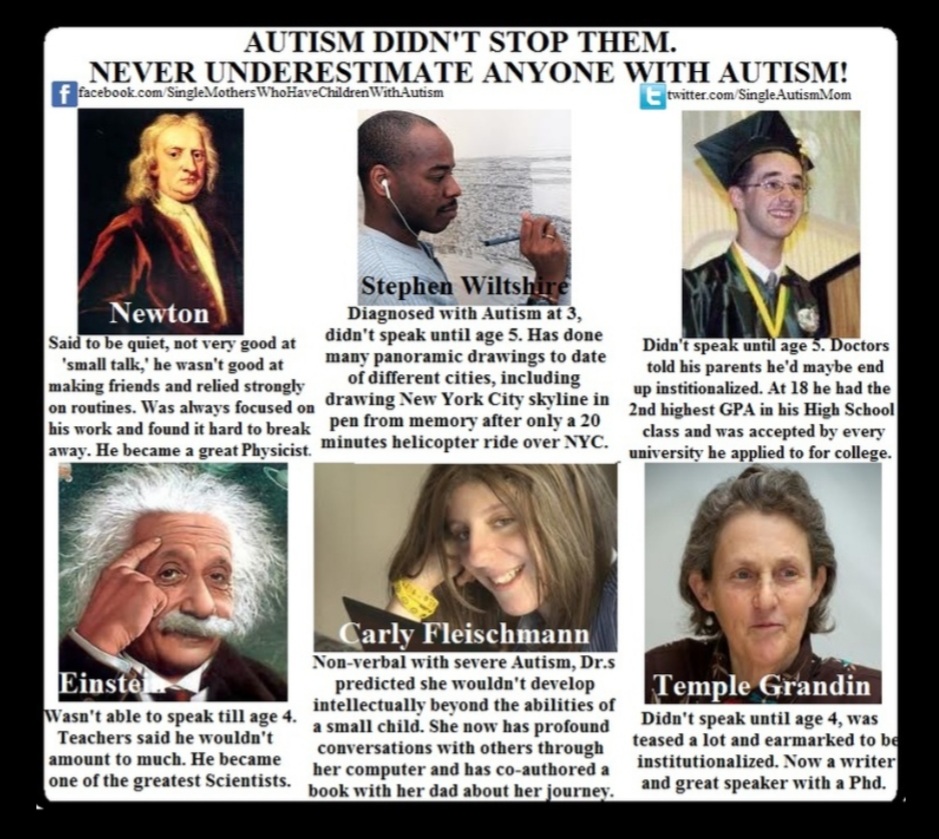AUTISM HUB - Where we get to learn and share Autism Spectrum Disorder (ASD) Matters

Feel Free to share and learn all things Autism on this conversation thread.
Комментарии
-
Parents / caregivers to children with autism, when you're child was first diagnosed, how did you react, feel and respond? Were you on denial for sometime or you started therapies immediately.
0 -
I would love to see how this engagement goes on!
1 -
This is interesting! I was part of a workshop and we were discussing on how adolescents with developmental disabilities undergo hysterotomy as it is assumed that women with developmental disabilities will not be able to manage their periods and pregnancy. Which is the biggest taboo!
1 -
5 Ways to Manage Stress While Raising A Child With Autism
Once we accept the diagnosis and learn to manage our own stress, raising a child with autism can be a uniquely rewarding experience.
Most parents will tell you that their children stole their hearts the very second they were born. It’s the nature of love and parenthood. We’re biologically programmed to take care of our offspring from the moment they take their first breath to the very instant we take our last one, and an autism diagnosis seldomly changes that. Still, being told that your child has autism could be a very difficult fact to accept, but by utilizing diverse coping strategies you can learn to navigate the sometimes-turbulent waters of autism for smoother sailing later on.
Dealing with the reality of the situation may take a bit of getting used to. Even if your child never personally experiences the negative emotions associated with their diagnosis, you and your family probably will. Some parents may even mourn the loss of the hopes and dreams they once held for their children – and that is completely OK. It is, however, incredibly important for parents to realize that their autistic children can also provide them with many unique joys.
Celebrating every accomplishment, exercising patience, loving unconditionally, and putting in consistent effort, can make a world of difference for you and your child now and in the future. So, to be better able to cope with your newly found circumstances, check out the strategies below.
1. Do Not Neglect Your Needs, Make Time for Personal Growth.
2. Embrace All of Your Emotions, Be a Slave to None of Them
3. Make Your Own Decisions, Adhere to Good Advice
4. Ask For Help, Try Helping Others
5. Make Time For Yourself, And Other Family Members
Like raising any other child, caring for a child with autism is full of challenges, rewards, and entirely unique experiences. It’s about making choices, resolving conflicts, finding the best possible solutions for unexpected problems, and providing consistent love and unconditional respect for the amazing individual you’re raising.
3 -
This is awesome @nyakianda Very Proud of you!
1 -
Autism Spectrum Disorders (ASD) in Kenya: Barriers Encountered in Diagnosis, Treatment and Management
Caring for children with Autism Spectrum Disorder (ASD) is demanding, especially where access to services and support are inadequate.
Treatments pursued by families include a range of behavioral, psychosocial, educational, medical, and complementary approaches that vary by a child's age and developmental status.
Caring for children with a severe form of the condition is demanding, especially where access to services and support are inadequate. ASDs often impose significant emotional and economic burden on people with these disorders and their families. Autism is such a developmental disability which has a great impact on the family's adaptation and functioning more so the mother.Families with a child diagnosed of ASD have to pass through compromising; sacrificing, stressful, and adjustment lifestyle
Below are some of the difficulties that parents, care givers and special needs providers encounter as they go about in the diagnosis, and treatment of autism in Kenya. 1. lack of awareness
2. limited research
3. cultural factors and beliefs
4. lack of institutional/government support
5. The out-of-reach financial price-tag for treatment / supplements of children with autism
6. Social stigma
7. Isolation and broken families
1 -
0
-
April is Autism acceptance and awareness month. In what ways do you plan on creating awareness and acceptance in your community? @SarahBosibori @SylviaMochabo @Faith_EnableMe @John
2 -
By having amazing discussions here about Autism and the myths and misconceptions we hold about Autism. Looking foward to have you lead these discussions @nyakianda
2 -
Types of sensitivity for people with ASD
These are the 5 most common types of sensitivities, but keep in mind that a person may be affected by more than one issue.
• Hyperacusis is an intolerance of everyday environmental sounds and is often associated with tinnitus, a ringing in the ears.
• Hypersensitive hearing of specific frequencies is often (but not always) associated with autism. A person is able to tolerate most sounds at normal levels, but certain frequencies are intolerable, especially above 70 decibels. For example, a person may have no difficulty being near a noisy dishwasher, but the higher frequency and higher decibel level of the vacuum cleaner will be painful.
• Recruitment is directly related to sensorineural hearing loss. It is defined as an atypical growth in the perception of loudness. Hair cells in the inner ear typically “translate” sound waves into nerve signals.
• Phonophobia (also called ligyrophobia or sonophobia) is a persistent and unusual fear of sound, either a specific sound such as an alarm or general environmental sounds.
• Misophonia is an emotional reaction, most often anger or rage, to specific sounds. The trigger is usually a relatively soft sound related to eating or breathing, and may be connected to only one or a few people who are emotionally close to the affected person.
Provide relief
Headphones and earplugs offer instant comfort and relief. Noise-canceling headphones are the most effective, because they replace irritating environmental noise by producing calming white noise. Earplugs are usually made of either foam or wax, and it is worth trying both types to determine which is more comfortable.
However, most audiologists, physicians, therapists and educators recommend against frequent use of headphones and earplugs, because a person can quickly become dependent on them. In the long run, blocking out noise can reduce coping skills and increase social withdrawal.
The world is noisy, but a person can easily live a full life without fireworks shows, major league sporting events and rock concerts. When sound sensitivity interferes with everyday activities, then it is time to look more carefully and seek guidance. A systematic approach to sound sensitivity can lead to a greater enjoyment of relationships and increased inclusion in community-based activities......But in the end, “The ocean cannot escape its waves.”
@pranav_kumar @DhanyaRavi @asha_1234 @Kaavya I would like to hear your thoughts on this.
0 -
Some celebrities who had autism but it did not stop them from getting at the top. #differentnotless
1 -
It will be my please. Thanks Faith.
0 -
Raising a teen with autism. What are some of the challenges faced by caregivers / parents?
0 -
Easter is here......holidays comes with lots of family gatherings. How do kids with autism handle new environment, lots of people and noice? For my daughter she first sests down to observe then hours later decides to shadow the other kids as they do their thing. Qhat are your kids experiences?
0 -
https://community.enableme.org/en/discussion/55673/creating-opportunities-for-youths-with-autism-in-kenya#latest
0 -
AUTISTIC TRAITS (an extensive list)
THINGS TO REMEMBER!
> No child with autism will have every trait listed
> Autistic traits are a spectrum creating a diversity of possibilities
> Every person with autism displays different traits during different circumstances and at varying degrees
> Identity of a person as an autistic is not formed by how many traits they have in this list
> The list will not have every autistic trait out there because who they are is INFINITE
The Traits!
* need for sameness/consistency (talk of routines)
* stimming with any of the senses
* under or overreaction to any of the senses
* eye contact is painful or uncomfortable
* meltdowns
* shutdowns
* photographic memory
* difficult with memory (short or long term)
* difficulty understanding timelines
* detail oriented (in seeing, thinking, speaking etc)
* tends to see the details rather than the bigger picture
* emotional regulation difficulty
* black and white thinking
* auditory processing issues
* sensory issues (over or under stimulation)
* social withdrawal
* does not read social cues
* cannot switch from one task to another on demand
* proprioception difficulties (stimuli to body movement & action)
* nonspeaking, semi-speaking & hyperverbal
* displays different facial expressions for emotions we're feeling eg smiles when we're sad
* trouble expressing ideas, thoughts and needs to others
* gives up on tasks not easily overcome
* trouble focusing
* needs repetition of instructions
* not a fan of small talk
* verbosity (being wordiness or using more words than needed)
* considered gifted or savant (a person with high level of knowhow/skill in one area, but usually less able in other fields)
* hands on/visual learners
* difficulty in lying (blatantly honest folks)
* different gait or posture
* has a different tone of voice, maybe monotone sometimes
* difficulty in understanding social hierarchies (eg teacher/parent is in charge)
* difficulties in taking turns (eg when it is our turn to speak)
* experiences intense, overwhelming emotions
* tantrums
* may not be interested in fantasy
* very rule oriented, it is hard to accept when rules are changed
* trouble understanding personal space
* interest in objects
* sensory seeking or sensory avoidance
* scripting - conversation rehearsing (echolalial and social scripting)
* copying another person's mannerism (talk of social scripting)
* food selectivity (picky eaters/ same food lovers)
* impulsivity
* hyperactivity
* short attention span
* problems with fine or gross motor skills
* trouble understanding body language and facial expressions
* difficulty seeing from another persons perspective
* difficulties with interoception (not knowing when hungry or when to go to toilet)
* prolonged staring/eaves dropping
* lack of fear towards danger
* sees, interacts with, understands and interprets the world in a completely different way
* sensitivity to the moods, energy and emotions around us
* difficulty telling left from right and compass directions
* stronger connections to animals
* intuition or sixth sense
* separation anxiety
* inability to multitask
* low or high threshold for feeling things physically (pain, heat, cold)
COMORBIDITIES
Here, a comorbidity refers to something you may be more likely to have alongside being autistic. Importantly to note, being autistic does not cause comorbidities!
* anxiety
* depression
* sleep problems
* gastrointestinal problems
* headaches/migraines
* seizures
* attention deficit hyperactivity disorder
* dyslexia
* dyspraxia
* dyscalculia
* motion sickness/vertigo
* Mast Cell Activation Syndrome (MCAS)
* tourette syndrome
* eating disorders
* sensory processing disorder
1
Разделы
- Все разделы
- 114 Здоровье
- 17 Заболевания и инвалидность в период войны
- 27 Ментальное здоровье
- 31 Физические ограничения
- 6 Сенсорные ограничения
- 5 Нарушения интеллектуального развития
- 16 Хронические заболевания
- 12 Вспомогательные технологии и терапия
- 104 Для проживающих в Украине
- 11 Оформление инвалидности во время войны
- 11 Путешествия и Мобильность
- 18 Работа и Профессия
- 16 Отношения, семья и дети
- 9 Образование
- 39 Финансовые и социальные вопросы
- 68 Сообщество
- 17 Редакторские посты
- 36 Хорошие новости
- 2 Поиск и Предложение
- 5 Поддержка и обратная связь
- 8 Кофейня
- 257 Для беженцев
- 44 Для тех, кто в дороге
- 5 Для беженцев в странах 🇪🇺 ЕС
- 34 Для беженцев в 🇵🇱 Польше
- 42 Для беженцев в 🇩🇪 Германии
- 18 Для беженцев в 🇨🇭 Швейцарии
- 19 Для беженцев в 🇹🇩 Румынии
- 12 Для беженцев в 🇧🇬 Болгарии
- 23 Для беженцев в 🇮🇹 Италии
- 14 Для беженцев в 🇹🇷 Турции
- 13 Для беженцев в 🇨🇦 Канаде
- 33 Для беженцев в 🇵🇹 Португалии



